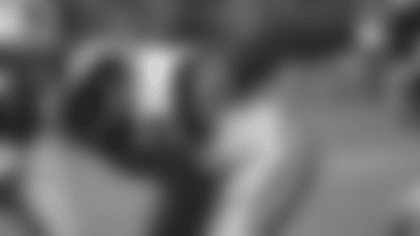Few life-changing moments such as being chosen in the first round of an NFL Draft are triggered by call waiting. But it happens. Six-foot-4, 314-pound proof of that is Wayne Gandy when he was picked by the Rams out of Auburn in 1994.
"I was actually on the phone with the Dolphins, they had the 16th pick," said Gandy, a consensus All-American offensive tackle. "They were talking about me catching a helicopter down to Miami, because I'm from Haines City, Florida, which is a little south of Orlando. So it was going to be a quick little draft. I was going to go to Miami.
"And then my phone beeped and it was the Rams with the 15th pick. Me and my agent had spoken and we didn't see the Rams taking a tackle, so I hadn't had them on my radar at all. But I didn't have this idea of where I wanted to go. I just wanted to get off the board as fast as possible."
From the time Gandy was born in 1971, the Rams had only taken three offensive tackles off the board in the first round. And for a good reason. Make that a great reason. However, they felt the time was right for him to be the fourth.
"They had this legend on the offensive line named Jackie Slater. And they felt like Jackie, who at that time, I want to say was in year 19, at any moment, he was going to retire. They were looking for me to come in and pick up the baton for his legacy," Gandy said.
"The only difference was Jackie was a right tackle; I fashioned myself as a left tackle. But the bar was already set for Ram offensive line excellence through him. So it was one of my great pleasures to be able to share our O-line room with one of the greats to ever do it."
Fortunately for Gandy, the O-line room was also like a classroom. Slater and the other veterans offered him valuable lessons on how the NFL was a different world.
"Wherever you were drafted, that just got you into the game. You're going to have to work," Gandy said. "You needed them to impart some of that knowledge more so off the field, in your home life, in your training, than anything else.
"Tom Newberry, Bern Brostek, we had a good veteran mixture of linemen with Jackie to be able to really, if anything, convey to me that it truly is a long race. It's a marathon, it's not a sprint. And mentally to prepare. As good as things can be, the bad times are going to test you more than anything. So mental toughness is what I would say those vets helped me with."

After making nine starts at right tackle as a rookie in place of Slater who had a tear in his triceps, Gandy became the starting left tackle the following season. But that wasn't the only change in 1995. The Rams cornered the market in change of address cards and headed east to St. Louis.
"It was different because L.A. is L.A. The excitement of the city, the people of the city, so many things to do, the better weather. I had no idea where St, Louis really was. It was one of those cities that you heard on Sanford and Son. Fred was always going to St Louis," Gandy laughed.
"But it was a true sports town. In L.A., you're not necessarily recognized in every avenue. Whereas, when you're in a small market like St. Louis, everybody knows you. So there was a big difference in that.
"And the media was different. It was a little more loving than the L.A. media. You couldn't do anything to satisfy them. Even if you won, you didn't win the right way. I learned to love St. Louis. It became a big part of my life, something that I really enjoyed."
Something less enjoyable in the early years under the Golden Arch were the coaching changes. Rich Brooks had replaced Chuck Knox and was the Rams' first head coach in St. Louis. But his tenure was only two seasons. In 1997, Dick Vermeil became the team's third head coach in four years.
"Regardless of what sport you're playing, turnover is very distracting," Gandy said. "Because it's not just that you're changing head coaches, typically, you're changing coordinators, the G.M., offensive line coaches, systems. And that was true each and every time.
"We went from the idea with Chuck Knox that we're going to run the 'Ground and Pound.' Rich Brooks came in and he was more of a taskmaster. His idea was more college-bound, a whole new staff, new techniques. And then Dick Vermeil comes in, and another staff, a new philosophy.
"But three coaches in four years, I think I had four O-line coaches in those four years. About year three, I was like, 'You know what? This is my style. I don't care what coach comes in. This is what I'm doing. Because I don't have time. I'm losing years and time to try to develop another style.' It was a very hectic time to do that."
While victories were less than frequent during Gandy's five seasons with the Rams, that doesn't mean his time with the team didn't produce fond memories.

"One thing that losing does generate; it generates a more purity to the friendship because you're the only people that have each other's back," Gandy said. "So something in those guys, even today, there's a kindred spirit that we share about those early years of trying to crack the league and win games."
Gandy would go on to spend the final ten of his fifteen seasons in the league with the Steelers, Saints, and Falcons. Deciding to make his home in Atlanta, in 2011, a neighbor who worked at a radio station, convinced him to give broadcasting a shot.
"We were kind of ahead of our time because we were basically a podcast then, and I enjoyed it," Gandy said. "It helped me with my color analyst work. Two years later, I started working for ESPN doing college football, mostly in the Sun Belt Conference. That worked over to me now doing college sometimes, but I do full-time high school here for GPB [Georgia Public Broadcasting], and I've won two Emmys for the color work I do for them."
He is also the host of a syndicated show, The Sports Joc Show with Wayne Gandy.
"We're in about 25 markets all over the country – iHeartRadio, Spotify, Audible, Amazon podcast, Apple podcast," Gandy said. "The way we did it back then is the way that sports are being supported now. I think that's why I say we were ahead of our time. We were more conversational about sports. It was more like if me and you went out with a bunch of friends and to a sports bar, the subject doesn't always stay on the same thing. We don't talk about the scores as much as we talk about personalities.
"I like that it keeps me involved in sports. I love to go to sporting events. I'm the guy that if I hear about any kind of sports, women tackle football to kickball, I'm in my car and I'm going to see it. I don't have to have a friend with a kid on the field. All you have to tell me is that these are the two best teams in the state at volleyball and I'm going."
Gandy's newest venture began in May when he became the co-owner and partner of a sports representation and management company – Gandy, Cornelio & Schwartz.
"The NIL component that is built into sports is something that I've talked about on my show," Gandy said. "The agent that I've partnered with, Neil Schwartz, was my agent when I played. And when I wanted to get into this space, I started listening and reading and watching and seeing how the kids were being, and I can't necessarily say exploited, but not educated.
"You get a lot of parents all of a sudden think they're agents, only to come back to regret it. I'm looking to get certified as an NFL agent in January. But until then, I'm just working in the space of trying to help kids make better decisions about their career.
"Because as much excitement as it seems that giving a college kid money can illuminate, it also is affecting the way that a lot of kids, if they lose focus, they'll never make it to the pros. And they'll wake up and leave college just as broke as they were when they went."
Away from sports, he's the father of an adult daughter, Phoenix. And what else is the best thing about being Wayne Gandy today?
"No matter whatever is going on, the great things that have happened, I've always been able to keep my feet on the ground," he said. "I'm satisfied with my contribution to the planet, what I've done. Some people aren't satisfied. They think they need more. I'm very fulfilled in all facets of my life."














